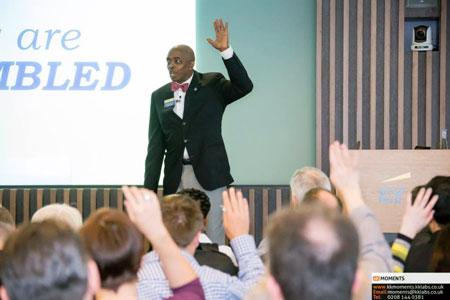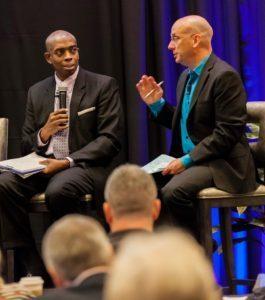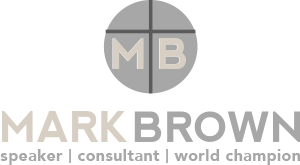For more than 25 years, I’ve both told and heard some very inspirational stories. Some were born of deep pain, some from the joyous celebrations, and some from the humorous side of life. As is my custom, I ask my speech coaching clients to unearth the poignant personal stories from their own lives, because I believe that the personal is powerful. In my experience, we humans tend to look for poignancy from our most extreme experiences. This is why I often hear aspiring speakers lamenting the fact that they don’t have spectacular stories to tell. They are looking at the EXTREMES for dramatic stories of tragedy and triumph, and finding none, they wonder if they really have ANYTHING of value to say. Well, there are several ways to ‘unearth’ great stories, and I’ll take a brief moment to expound upon one specific method.
There is much to be said for how we respond, and the lessons we learn, when something goes wrong. Things go wrong for myriad reasons, including our own errors, the fault of someone else, or because of the well-used ‘circumstances beyond our control’. When something goes wrong, it’s a natural human tendency to seek to lay blame on some one, some thing or some powerful external force. Despite all that, the experience itself can make for an interesting…if not intriguing…personal story. Now I accept that it may not be natural to look for life-altering stories when something goes wrong. But there’s a story there. Here’s an example: My wife Andrea and I live in the country in central Georgia USA and one night while driving home several months ago, we…well…I…hit a deer. And get this; it wasn’t the first time! I had hit a deer a few years earlier, in the same car! On both occasions it was dark. On both occasions we were within 5 miles of our home. And on both occasions the deer had seemingly jumped out of NOWHERE and I hardly had time to respond. We were SO CLOSE to getting home, and then something went wrong, through no fault of our own. Andrea’s car sustained damage to the hood/bonnet, front fender, turning lights and headlight. The damage wasn’t severe enough to disable the car, and we were able to drive home without difficulty. Never the less, we had to contact our insurance company and arrange for repairs. We also had to get Andrea a rental vehicle while her car was being fixed, which alleviated the inconvenience of not having HER car for several days. This wasn’t a tragedy or anything life-threatening, but it was a disruption, and we had to decide how would respond. A simple lesson became clear to me; when things go wrong, they present numerous learning opportunities.
Are we willing to give grace to others? Are we patient? Do we have, and can we build problem-solving skills? What kind of temperament do we have? Are we easily upset and flustered? Are we short-tempered? The lessons that we learn about ourselves when things go wrong, are the principles and lessons that we can share with our eager audiences. It is almost certain that they have had experiences where something has gone wrong, and will have them again. That makes them prime candidates to benefit from the wisdom of your experience and the lessons you have learned. This will require practical application so here’s an idea: Think about the last week or two. What went wrong, or didn’t go according to plan? That experience could be a good fit for your next speech or presentation, because sometimes, the things that go WRONG will fit your presentation just RIGHT!

STORY IDEA
Many people keep a journal of their day-to-day thoughts and experiences. Very often, those journal entries contain experiences that we have forgotten about. If you keep a journal, consider reviewing older entries. They can trigger a memory that would be worthwhile sharing because of the lessons that can be gleaned from their telling. If journal-writing is ‘not your thing’, perhaps like me you keep a calendar of appointments. Maybe you maintain notes of daily experiences that you review at the end of each day. These are all sources for stories. Use them as powerful tools to TELL YOUR STORY!

STORY Q&A
Q. I don’t have many opportunities to practice my speech and I want to be really comfortable in front of my audience. I want to make sure that my gestures and movement work too. What should I do…practice in front of a mirror?
A. While a mirror will give a reflection of what you look like, I recommend that whenever you DO get a chance to speak to a live audience, VIDEO RECORD YOUR PRESENTATION! When you rehearse at home, VIDEO RECORD YOUR PRESENTATION! If you rehearse in a cavernous auditorium, VIDEO RECORD YOUR PRESENTATION! Most importantly, WATCH YOUR VIDEO, no matter how painful it may be. You will then more accurately see what your audience sees, and you can assess yourself with a critical eye. The insights and perspective you gain will enable you to make important adjustments, and equip you to better TELL YOUR STORY!

I’m excited to work with my friend and fellow World Champion Darren LaCroix to present the ONLY East Coast Stage Time University event, UNFORGETTABLE PRESENTATIONS in Atlanta, GA on December 7 & 8! If you want to stand out as a presenter, this event is for YOU. Limited seating is available LIVE, VIRTUALLY and for VIPs, who will get personal attention and coaching at the event. This is a ONE-TIME-ONLY event! Join us, and leave with version 1.0 of your UNFORGETTABLE PRESENTATION.

Join us! Get Workshop Details – See the Virtual Seat!
ALSO Mark your calendar for UPCOMING MASTER WORKSHOPS from Stage Time University!
Get details on LIVE EVENTS here!
Let us help you to make your presentations UNFORGETTABLE!


